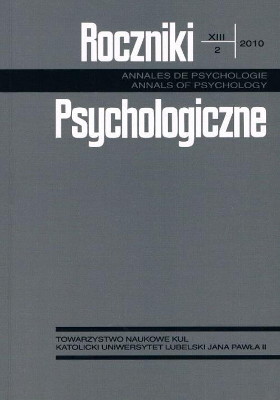The role of cues and beliefs in long-term memory for prices
Abstract
Several studies have indicated that people tend to underestimate prices from recent years. Two experiments were conducted to analyze factors that are responsible for the systematic bias. It has been assumed that the tendency results from misremembering the time of the price as well as general beliefs about stable and significant price increases. As expected, the tendency was diminished when participants were provided with temporal cues and did not emerge for the product that was considered to become cheaper. The results accord well with the associative theory of memory for prices (Kemp, 1999), the encoding specificity principle (Tulving & Thompson, 1973), as well as retrieval conceptualizations in which implicit theories of change are stressed (Ross, 1989).
References
Bates, J. M., Gabor, A. (1986). Price perception in creeping inflation: Report on an inquiry. Journal of Economic Psychology, 7, 291-314.
Cestari, V., Del Giovane, P., Rossi-Arnaud, C. (2007). Memory for prices and the euro cash changeover: An analysis for cinema prices in Italy. Bank of Italy Economic Research Paper, 619; http://papers.ssrn.com/sol3/papers.cfm?abstract_id=970301 (8.10.2007).
Conway, M. A. (1992). A structural model of autobiographical memory. W: M. A. Conway, D. C. Rubin, H. Spinnler, W. A. Wagenaar (red.), Theoretical perspectives on autobiographical memory (s. 167-193). Dordrecht: Kluwer Academic Publisher.
Davies, P. J. (1999). Gender differences in autobiographical memory for childhood emotional experiences. Journal of Personality and Social Psychology, 76, 3, 498-510.
Del Giovane, P., Sabbatini, R. (2006). Perceived and measured inflation after the launch of the euro: Explaining the gap in Italy. Giornale degli Economisti e Annali di Economia, 65, 2, 155-192. Falkowski, A., Tyszka, T. (2009). Psychologia zachowań konsumenckich. Gdańsk: Gdańskie Wydawnictwo Psychologiczne.
Janssen, S. M. J., Chessa, A. G., Murre, J. M. J. (2006). Memory for time: How people date events. Memory & Cognition, 34, 137-148.
Kemp, S. (1984). Perception of changes in the cost of living. Journal of Economic Psychology, 5, 313-323.
Kemp, S. (1987). Estimation of past prices. Journal of Economic Psychology, 8, 181-189.
Kemp, S. (1991). Remembering and dating past prices. Journal of Economic Psychology, 12, 431-445. Kemp, S. (1999). An associative theory of estimating past dates and past prices. Psychonomic Bulletin & Review, 6, 1, 41-56.
Kemp, S., Willetts, K. (1996). Remembering the price of wool. Journal of Economic Psychology, 17, 115-125.
Łyziak, T. (2003). Consumer inflation expectations in Poland. Working Paper Series, European Central Bank, 287; http://www.ecb.int/pub/scientific/wps/author/html/author310.en.html (21.11.2008).
Marques, J. P., Dehaene, S. (2004). Developing intuition for prices in euros: Rescaling or relearning prices? Journal of Experimental Psychology: Applied, 10, 3, 148-155.
McFarland, C., Ross, M. (1987). The relation between current impressions and memories of self and dating partners. Personality and Social Psychology Bulletin, 13, 228-238.
McFarland, C., Ross, M., Giltrow, M. (1992). Biased recollection in older adults: The role of implicit theories of aging. Journal of Personality and Social Psychology, 62, 837-850.
Niedźwieńska, A. (2003). Gender differences in vivid memories. Sex Roles, 49, 321-331.
Prohaska, V., Brown, N. R., Belli, R. F. (1998). Forward telescoping: The question matters. Memory, 6, 4, 455-465.
Ross, M. (1989). Relation of implicit theories to the construction of personal histories. Psychological Review, 96, 341-357.
Ross, M., Holmberg, D. (1990). Recounting the past: Gender differences in the recall of events in the history of a close relationship. W: M. P. Zanna, J. M. Olson (red.), Self-inference processes (s. 135-152). Hillsdale, NJ: Erlbaum.
Strzeszewski, M. (2006). Najważniejsze wydarzenia 2005 roku dla Polski i świata (komunikat z badań nr BS/16/2006). Warszawa: Centrum Badania Opinii Społecznej; http://www.cbos.pl/ SPISK0M.P0L/2006/k_016_06.pdf (21.02.2008).
Thompson, C. P. (1990). Reconstructing the dates of personal events: Gender differences in accuracy. Applied Cognitive Psychology, 4, 371-381.
Tulving, E., Thompson, D. M. (1973). Encoding specificity and retrieval processes in episodic memory. Psychological Review, 80, 352-373.
Vartia, P., Mankinen, R. (1984). Perceived and expected price changes in Finland. Weltwirtschaftliches Archiv, 120, 121-132.
Webster, J. D., McCall, M. E. (1999). Reminiscence function across adulthood: A replication and extension. Journal of Adult Development, 6, 1, 73-85.
Willard, G., Gramzow, R. H. (2008). Exaggeration in memory: Systematic distortion of self-evaluative information under reduced accessibility. Journal of Experimental Social Psychology, 44, 246-259.
Yarmey, A. D. (1993). Adult age and gender differences in eyewitness recall in field settings. Journal of Applied Social Psychology, 23, 1921-1932.
Copyright (c) 2010 Roczniki Psychologiczne

This work is licensed under a Creative Commons Attribution-NonCommercial-NoDerivatives 4.0 International License.


